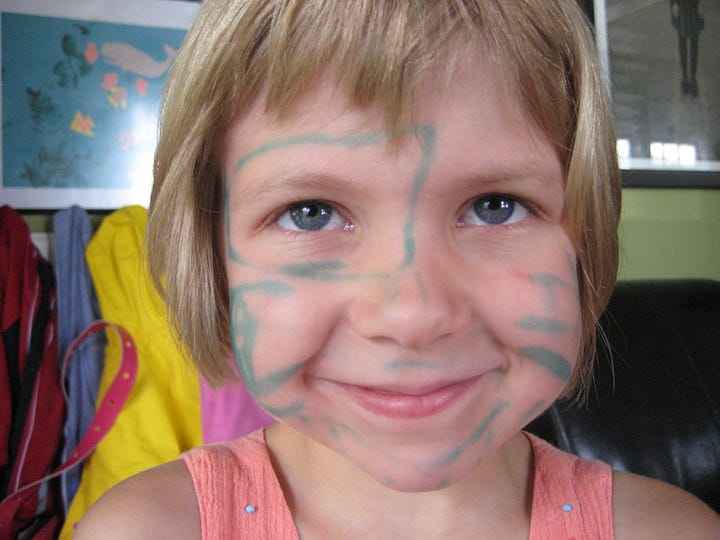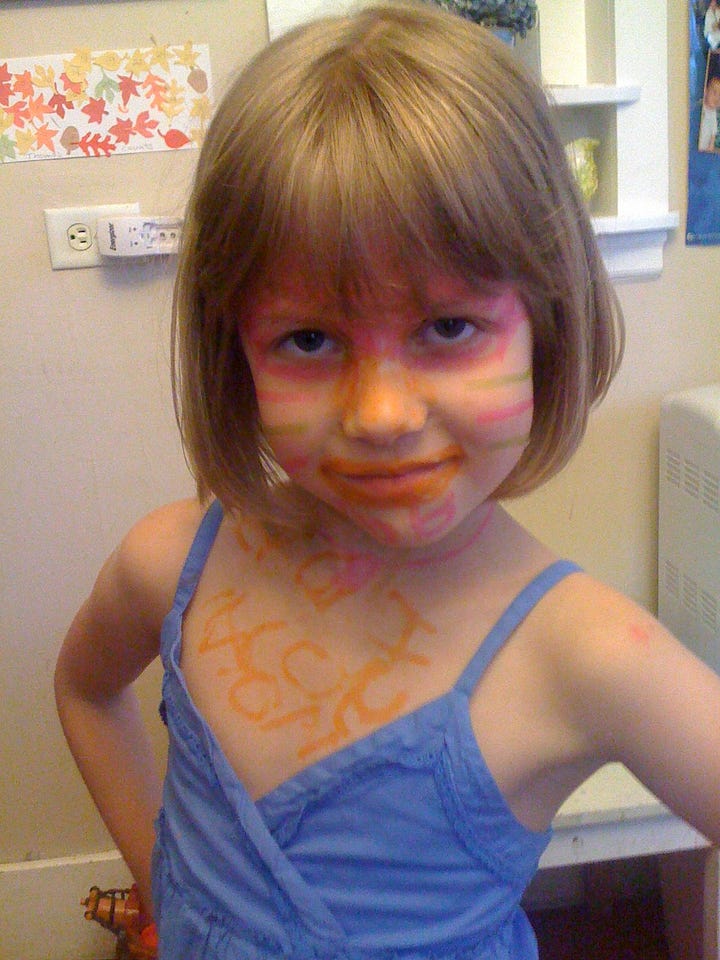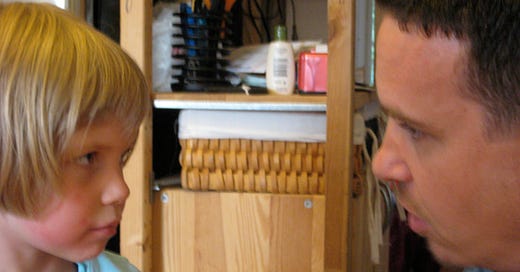"I'm sorry I was a bitch to you this morning."
Read an excerpt from my parenting memoir's apology chapter
I’m currently writing a parenting memoir about all of the interesting, difficult, and uncomfortable conversations or scenarios we’ve faced together as a family. It includes topics like death, faith, racism, and mental health, among others. For a little while, I’m using this newsletter to help me focus on finishing the first draft. You can read other posts about writing my book HERE.
Hi, it’s me.
Before the holidays, I worked a chapter of my book that is turning out to be my favorite so far. But I’ve never written a book before… is it okay to have a favorite chapter? Or is it like not picking a favorite among your own kids?
Assuming it’s okay to have a favorite chapter, I like it because of the stories within, plus it is (so far) the clearest example I have of seeing an outcome of my insecure, I-don’t-know-what-the-hell-I’m-doing parenting choices.
What you’re reading below is a Shitty First Draft. Like, REALLY shitty. I wrote it out in one sitting and haven’t done any editing or scene building. My goal in this Shitty First Draft is to get the stories out of my head and strung together into a narrative order that makes sense. This summer I’ll go back through the full draft (hopefully with an editor) to unshittify it.
With this in mind, know that:
I haven’t figured out past tense and present tense, yet, so I do a lot of switching back and forth arbitrarily. I won’t worry about sorting this out until I have a full draft written.
In a few places, I reference stories from two previous chapters — one on death and one on faith. I’ll footnote those moments and briefly describe the context.
The excerpt you’re about to read is the chapter opening and is around 2,000 words. The full chapter is around 4200 words (so far) and goes into some of my personal backstory of apologies, forgiveness, and reconciliation (or not) over the years.
I’m interested in knowing if any of this resonates with you, whether you are a parent or not. (Currently working through my fear that nobody cares what I have to say). Thanks for reading.
Until next time,
Jen
p.s. I’m sorry this one is so long. If you’re new here I promise I’m not always this demanding of your time. But now is a good spot for a bathroom break if you needed it.
The Apology
Bryan and I bought Ruthie her first smart phone in middle school, right before she turned eleven years old. It was 2013, the year iPhones were sold in fun colors other than black or white, and we got her one in bright blue. She had been asking for one all year, but aside from her begging, it was actually becoming necessary for her to have her own phone. She had started babysitting for families who didn’t have a landline! We didn’t have a landline anymore either, and we were starting to leave the kids home alone for date nights.
That Christmas we were in California with Bryan’s brother’s family, opening presents with cousins and grandparents. Gift opening in our family is somewhat ordered as we take turns opening presents and thanking the gift giver. When it was Ruthie’s turn, she tore off the wrapping paper, saw the crisp white box with the silver Apple logo on it, and squealed while flailing around on the floor (she gets her drama from me).
“There will be rules,” I said.
“I know! Thankyouthankyouthankyou!” she squealed.
One of those rules was that, for awhile, Bryan and I would spot check her phone activity. We explained it to her using a driving analogy. When she turned sixteen we weren’t going to just hand her the keys to our car and say, “Have fun out there on the big open highway!” She’ll take driving classes to learn the basics of operating a vehicle as well as things like road rules, how to be aware of your surroundings, the importance of not driving while impaired, and the consequences of being careless about these things. And for a while, she’ll practice driving with an adult in the car to make sure she’s confident, safe, and making good decisions.
In the same vein, we weren’t just going to hand her a pocket computer and say, “Have fun out there on the big open internet!” We wanted her to enjoy the privilege of using a smartphone, but it came with a learner’s permit — issued by us — for a finite period of time. I was never interested in butting into her middle school girl drama. It was both entertaining and eye-rolling, but I mostly stayed out of it. Instead, we had bigger-picture conversations like these about the responsibility of having the World Wide Web at her fingertips:1
All your social media accounts are set to private. Don’t connect with anyone you don’t know in real life, and don’t use any apps that can’t be set to private. The main off-limits app I remember at the time was Snap-Chat because there was no way to control privacy settings.
Don’t say something to someone online that you wouldn’t say to their face.
What you put online stays online forever and can be shared with anyone forever and always. Would you tattoo your face? No. I hope not, anyway. Assuming you would never tattoo your face, think of the internet as a face tattoo and just think for a minute before putting something out there.2
Don’t send pictures of your boobs or your crotch to anyone. And I mean for real. At the time Ruthie got her smartphone, laws about distributing child pornography hadn’t caught up with the internet yet, and teenagers could be charged with a federal crime for sending a boob pic to their horny boyfriend. Did she want to register as a sex offender for the rest of her life? I didn’t think so.
So when I spot-checked her phone, these were the kinds of things I was looking for – both in what she was putting out there and what she was exposing herself to. One example of something I found was an Instagram account started by some anonymous students at the middle school that paired two girls together for people to rank in the comments. Or they would pair a boy and girl together and ask people to vote if they should be a couple. When I saw these posts, we could have a conversation about them, but I would never know about it if I didn’t occasionally look through her phone.
One day I scrolled through her texts real quick and saw something.
Ruthie: I’m sorry I was a bitch to you this morning. Do you forgive me?
Friend: Yeah.
This simple exchange brought a smile to my face. I had no idea what the drama was, nor did I care to know. But unprompted by me, Ruthie had apologized to her friend for acting like a bitch.
I remember this moment for being a first and rare opportunity to see the fruits of our labor. Years of parenting led to this moment. Years of wondering if they listen, if my words matter, if I’m setting the right example. And after years of playing the long game, I finally experienced an outcome: It turns out they do listen. At least Ruthie did – about this one thing. So far, it looked like I was raising a human who could admit when she was wrong and try to make it right. I was elated and relieved.
Modeling Apologies
I’ve always felt strongly about apologizing to the kids. I fucked up all the time as a parent, and I felt internally driven to admit this to them and say I’m sorry. Forgiveness is the story of the gospel: Christ loving us despite our fuck-ups, asking us to take responsibility for what we’ve done (the concept of repentance), and forgiving us, which is to say, Christ doesn’t hold our fuck-ups over our heads for eternity. Forgiveness and reconciliation are the cornerstones of our faith. In Christ, we can be reconciled with ourselves, our God, and each other.
Kids don’t understand this. I know I didn’t understand this when I clenched my hands together and spoke the sinner’s prayer at Vacation Bible School, and I still didn’t understand this well into my 20s when all I wanted was for my sad and tragic boyfriend to recite a recipe for salvation.3
As a parent, I saw myself as the gateway drug to Jesus. Through us first, our kids learn to understanding the dynamic of inflicting pain on someone, and the emotional and relational consequences of causing that pain.
I will inflict pain on my daughter often when she is young, yelling at her with biting frustration. Sighing with disappointment when she walks into the room after a nap before I’m done doing something requiring focus. Losing my shit when she does regular four-year-old stuff like spilling something on the couch.
The anguish I feel in these moments overwhelms me. Why do I yell? Why can’t I keep my shit together? I take a deep breath, put myself in a time out. I apologize.
“Baby, I’m sorry. Mommy shouldn’t have yelled at you like that. I overreacted. I’m frustrated, but I shouldn’t have yelled at you. Will you please forgive me?”
She nods. I wipe her tears. We hug. Then we snuggle for awhile. I assume she’s too young to understand any of it, but I know she can feel it. She can feel my anger, and she can feel my sorrow, and she can feel my love. She doesn’t understand what any of it means, but over time there is a pattern. So when her little brother comes along, and she grabs his toy while pushing him down, and he cries, she recognizes the pattern I initiate.
“Babe, you can’t do that. If you want the toy, use your words to ask him for it. Can you apologize to your brother and give him the toy back please?”
She’s reluctant. She’s always reluctant. I can almost read her little mind as it justifies that it’s her toy and she’ll do anything to keep it from him.
When the kids are older and we ask them to apologize, it’s often a huffy “I’m SORRY!”
“Can you try that again?” we’ll say.
Her body vibrating with anger, Ruthie will push “I’m sorry!” out through clenched teeth and a sour face.
“Hey, can you try one more time? Like you mean it?” we say.
Her shoulders relax and her face softens. “I’m sorry,” she will say gently.
Bryan and I will have many conversations about whether or not we’re simply teaching the kids to be good actors. He is logical, and I’m emotional. I want them to feel something, he wants them to practice something. We have no idea how this will turn out. I keep thinking that Ted Bundy seemed like a super amenable guy on the outside. Did his parents teach him to act like he was sorry?
We parent like this for years, groping our way through low-visibility terrain, only seeing a few steps in front of us at a time. And then one day in middle school, I see the text:
Ruthie: I’m sorry I was a bitch to you this morning. Do you forgive me?
Friend: Yeah.
I’m crying and laughing at the same time. We did it. We made it through the fog to a clearing and Mount Rainier sits gloriously in front of us, a visually stunning reward for our long drive through unknown territory. I close the text app, wipe my face, and return the phone to Ruthie’s room.
“Thanks babe,” I say, handing her the phone. I turn and walk into the kitchen to make dinner.
“That’s not how I was raised.”
A few weeks ago as I’m writing this, Ruthie tells me that something I said hurt her friend’s feelings. Her friend is like a second daughter to us. She calls me Mama. They’re 20 years old now, and have been friends since the fourth grade.
When it happened, the house was full of people — mostly teenagers and young adults (we’re the cool house). The banter was flying, and I couldn’t recall anything specific I had said.
When Rue’s friend explained what had hurt her feelings, she couldn’t make eye contact with me. Ruthie sat on the couch next to her for support.
“I’m really sorry,” I said. “I got caught up in the banter and took it too far. We joke around like that in our family and I sometimes forget that other people aren’t used to it.”
She stared at me for a couple of blinks. “Wow, thank you,” she said. “I was bracing myself for a ‘Yeah, but…”
“That’s not how I was raised,” Ruthie said. “In our house we weren’t allowed to say ‘I’m sorry but…’ It’s just, ‘I’m sorry.’” And then she added, “I TOLD you it would be fine talking to her!”
I’m crying again, just a little bit. Since Ruthie started university, there have been more moments like these where I learn we’ve maybe done a pretty good job, that the darts we threw in the dark landed pretty close to the target.4
Your Turn
I welcome your feedback on this story draft, understanding that it’s generous of you to chime in. Thank you! If it helps, you can use these prompts:
How does this story make you feel? Are there particular moments in it that sparked a reaction?
Are there slow parts that don’t move the story forward? Parts you wish had more detail?
What is your own first memory of someone apologizing to you? As a child, how did your family talk about wrong-doing and apologizing?
Would love to hear from you in the comments. If you’d rather comment to me privately, simply reply to this email — it goes to jenzug@substack.com.
I learned these suggested guidelines from an internet safety expert named named Katie Greer, who spoke to parents at our neighborhood middle school. I liked her presentation because she wasn’t an alarmist who made the internet feel scary. She helped us make it accessible and safe.
I’m laughing now as I re-read this because it was always entirely plausible that she would end up tattoo-ing her face. She was always tattooing her face. And arms. And legs. I might need to revise this part. 😂


In a prior chapter I establish my Faith Origin Story, growing up in the church, Bryan’s Faith Origin Story (FOS), and how we each carried our FOS into parenting. I’m calling back to stories within that chapter.
Yes, I’m aware that I have, like, multiple metaphors going on (darts, foggy road, etc). I’ll sort it out later.





I think most of parenting is doing what you think is right and hoping for the best. We get abstract feedback on how its going here and there, but that's more in the /absence/ of things happening (kid isn't failing, didn't get in a fight, etc.). But once in awhile an event like your daughter's text exchange comes out of nowhere and let's you know that, yes, that you've been doing good work. I think you've done a good job of articulating what is often really hard to describe.
As for my own upbringing: I'm almost 50, and I'm not sure I've ever heard my mom apologize. Certainly not to me, anyway. Same story with my dad when he was still alive.
Keep going, Jen! Your words need a wider audience. I really like the way you included a more recent example. That's the part that resonated with me the most, maybe because I have recently apologized to both my young adult kids for a couple things I wish I had done differently in their younger years. (Also, I kind of love that you were proud of your daughter/parenting because of her apology, and completely skipped over the use of the word bitch. That would trip up some of the parents I've worked with in my churches. Let's normalize real-life vocabularies in faith-based books and families.) Also thanks for the driver's license image of phone education.